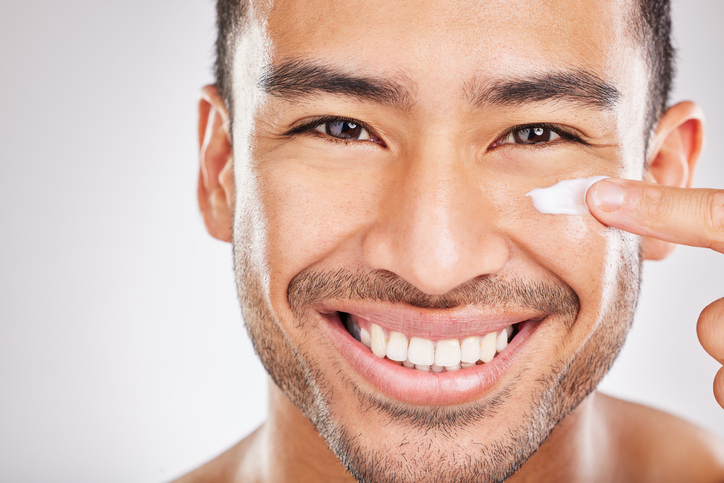November is National Healthy Skin Month. Let’s Celebrate By Being Proactive.

By Joy Stephenson-Laws, JD, Founder
The American Academy of Dermatology (AAD) has declared the month of November as National Healthy Skin Month®. Our skin is a very important organ. It is the body’s largest organ, and its main function is to provide protection against elements such as bacteria, chemicals and temperature.
Many people are genetically gifted with nearly flawless skin. Others have at least one complaint about their skin - acne, wrinkles, sun damage, dryness, excessive oiliness, discoloration, textural issues and more. Our skin is what we present to the world and having healthy, glowing skin provides us with a sense of confidence and empowerment.
"Everybody needs good skin care — from newborns to people more than 100 years old. That’s why National Healthy Skin Month is everyone’s awareness month,” the AAD claims.
“This November, we’re sharing simple tips from seven dermatologists that you can do at home to keep your skin, hair, and nails healthy and looking their best.”
In total, the AAD offers seven tips. Let’s go over them:
- Reducing wrinkles. As long as you are alive, aging is inevitable which, of course, contributes to the formation of wrinkles. Sun damage is also a major contributor to wrinkles, so sun protection is key. One dermatologist also points out the value in becoming a back sleeper. Sleeping on your side or stomach may cause ‘sleep lines’ on the face and chest.
- Proper makeup removal. The skin on the eyelids and around the eyes is especially delicate and sensitive to signs of aging. “Petroleum jelly is an effective way to remove your eye makeup and rehydrate eyelid skin. To remove makeup, apply a thin coat of petroleum jelly and gently wipe it off with a tissue or cloth. Then gently spread any remaining jelly onto your eyelids, which will rehydrate your skin overnight,” offered one of the dermatologists the AAD highlighted.
- Proper use of retinoids. Basically, retinoids are the holy grail of anti-aging skincare. They are vitamin A derivatives known for increasing skin cell turnover (which slows down a lot with age) and increasing the production of collagen (something else that also slows down significantly with age). Some retinoids are even used to treat acne. Retinoids may, however, cause dry and irritated skin which is why sun protection is key. It is also imperative to slowly and sparingly incorporate a retinoid in your skincare routine to see how you react. If your skin gets irritated, the AAD suggests using the retinoid “two to three times a week for a couple of weeks or so.” In my opinion, retinoids are like supplements. Just like supplements, you can buy all different kinds of retinoids online or at your local beauty store. Despite them being readily available, I highly suggest seeking the advice of a competent dermatologist before adding a retinoid into your regimen.
- More on retinoids. “Before you apply a retinoid to your face, dab a small amount of petroleum jelly or a hydrating moisturizer under your eyes, to the outer edges of your nose, and to the corners of your mouth as shown below [you can view here],” offers another dermatologist with the AAD.
- Dry hands and brittle nails. So many of us suffer from this after years of excessive hand washing and using sanitizers. It’s still important for us all to practice good hand washing hygiene (especially now that we are in the thick of cold and flu season), but applying a petroleum-like jelly to your hands and massaging it into your cuticles is a good way to combat dry hands and brittle nails. My personal tip: If you don’t like your hands getting all greasy during the day, stick with a scent-free lotion and then at night slather your hands in petroleum jelly, coconut oil or shea butter and wear overnight moisturizing gloves.
- Preventing nail fungus. Keeping your feet dry and treating existing athlete’s foot are key steps you can take in preventing nail fungus.
- For healthier hair. The AAD encourages people to keep up with regular hair cuts and trims to avoid split ends and promote healthier hair growth. I think a lot of people do not make the connection that for healthier hair, we need healthier skin. The skin on your scalp needs to be healthy for healthy hair growth. Keeping your scalp clean and free of irritation is key. If you have a chronically itchy scalp or suffer from hair loss, I highly recommend seeing a trichologist.
Although these are all great tips, I think the American Academy of Dermatology left out some invaluable advice when it comes to achieving and maintaining healthy skin. Nutrition, for example, is huge.
If you consume a nutrient-void, processed food diet and drink a lot of soda and alcohol, it is very likely you will have a dull and dehydrated complexion. A diet like this promotes inflammation which may promote acne and even premature wrinkles. A high-sugar diet is known to cause more wrinkles in the skin by compromising the production of collagen and elastin through a process known as glycation.
On the other hand, consuming an anti-inflammatory diet, which includes plenty of nutrient-dense, plant-based foods such as fruits, vegetables, herbs, spices and legumes, is known to promote a radiant complexion. A healthy diet also provides protection from everyday elements that age and damage our skin such as exposure to pollution and excessive sun exposure. A good rule of thumb is to ‘eat the rainbow.’ Go for as many naturally bright and colorful foods as you can. For example, leafy greens, oranges, berries, beets, sweet potatoes, and pineapple provide protective nutrients such as vitamins A, C and E. Eating nuts, avocado and fatty fish such as salmon is also great for skin health as these foods provide healthy fats that the skin needs to stay supple. Of course, drinking plenty of water is key for hydrated, healthy skin.

Be good to your skin. You'll wear it every day for the rest of your life,"
Renee Rouleau
Avoid Nutritional Deficiencies.
It is impossible to achieve your best skin if you suffer from nutritional deficiencies, and the truth is that so many of us do! The good news is that you can overcome them by assessing exactly what your nutrient needs are by undergoing routine nutrient testing. If you find out you are not balanced nutritionally or have any nutrient deficiencies, a competent healthcare professional can work with you regarding making the necessary dietary changes and recommend quality supplements if necessary.
My other top tips for healthy skin are to avoid smoking at all costs, manage stress and get good quality sleep. I also believe that it’s really important to pamper yourself and your skin when you can with facials. My personal favorite facial is the facial which improves blood flow and increase the skin’s elasticity.


I like my skin best when it's clean and glowy, and that comes from sleep, hydration, and happiness," Tracee Ellis Ross
If something is going on with us healthwise, sometimes our skin tries to ‘tell us’ this. For example, people who have diabetes (and may not know it yet) may have a skin condition called acanthosis nigricans which results in a person having dark, velvety patches of skin that occurs in areas such as the neck, armpits and groin.
As always, be sure to check your moles for odd shapes and unusual textures. It is also recommended to get a yearly scan for skin cancer.
Let’s love the skin we are in! Enjoy your healthy life!
Disclaimer: This article is not intended to provide medical advice. Please consult with your doctor or another competent healthcare practitioner to get specific medical advice for your situation.
The pH professional health care team includes recognized experts from a variety of health care and related disciplines, including physicians, attorneys, nutritionists, nurses, and certified fitness instructors. This team also includes the members of the pH Medical Advisory Board, which constantly monitors all pH programs, products, and services. To learn more about the pH Medical Advisory Board, click here.







